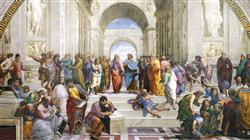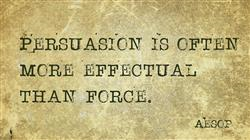University certificate
The world's largest faculty of education”
Introduction to the Program
The Teaching of Philosophical Discussions: an indispensable tool in the education of every citizen"

Philosophy is new thinking based on evidence and studies involving the causes and effects of natural things, man and the universe. Therefore, it is constantly evolving, since it is based on thoughts and social currents, as well as on everyday behaviors and situations of life itself.
In view of this, various thoughts have arisen that often differ from others. In view of this, TECH has created this degree in order to provide updated information on philosophical discussions, so that you can understand all the currents of thought present and that have a place in everyday life.
This is a Postgraduate certificate that delves into the recognition and importance of the other, as well as the present and the importance of diversification, understanding that people think and act differently, following their principles and education, which leads to their own philosophies of life.
All this content will be available in an audiovisual material, full of complementary reading, simulation-based exercises and interactive videos that expose the main features of philosophical discussion and teaching. It is worth noting that, as this is a 100% online program, the professional will not have to attend classes in person and will be able to take the training at his or her convenience, only needing a device with an internet connection.
You will have at your disposal the most powerful online platform in the educational market, which will allow you to use state-of-the-art learning tools, such as our interactive video system"
This Postgraduate certificate in Teaching Philosophical Discussions contains the most complete and up-to-date program on the market. Its most notable features are:
- Case studies presented by experts in education philosophy
- The graphic, schematic, and practical contents with which they are created, provide practical information on the disciplines that are essential for professional practice
- Practical exercises where self-assessment can be used to improve learning
- Its special emphasis on innovative methodologies
- Theoretical lessons, questions to the expert, debate forums on controversial topics, and individual reflection assignments
- Content that is accessible from any fixed or portable device with an Internet connection
Specialize with the world's largest online university and enjoy a high-level educational experience"
Our teaching staff is composed of Philosophy professionals, practicing specialists. In this way, TECH ensures to provide students with the up-to-date education intends. A multidisciplinary team of trained and experienced professionals who will cover the theoretical knowledge in an efficient way, but, above all, who will bring the practical knowledge derived from their own experience to the course: one of the differential qualities of this program.
This mastery of the subject matter is complemented by the effectiveness of the methodological design. Developed by a multidisciplinary team of e-learning experts, it integrates the latest advances in educational technology. In this way, you will be able to study with a range of comfortable and versatile multimedia tools that will give you the operability you need in your education.
The design of this program is based on Problem-Based Learning: an approach that conceives learning as a highly practical process. To achieve this remotely, with the help of an innovative, interactive video system, and through telepractice and Learning From an Expert systems, students will be able to acquire the knowledge as if they were working on the case in real life. A concept that will allow students to integrate and memorize what they have learnt in a more realistic and permanent way.
The most developed and interactive online resources, at your service, in a program of great educational and technological quality"

Education and the challenge of interculturality, in a program with all the specific contents of this area of philosophy"
Why study at TECH?
TECH is the world’s largest online university. With an impressive catalog of more than 14,000 university programs available in 11 languages, it is positioned as a leader in employability, with a 99% job placement rate. In addition, it relies on an enormous faculty of more than 6,000 professors of the highest international renown.

Study at the world's largest online university and guarantee your professional success. The future starts at TECH”
The world’s best online university according to FORBES
The prestigious Forbes magazine, specialized in business and finance, has highlighted TECH as “the world's best online university” This is what they have recently stated in an article in their digital edition in which they echo the success story of this institution, “thanks to the academic offer it provides, the selection of its teaching staff, and an innovative learning method aimed at educating the professionals of the future”
A revolutionary study method, a cutting-edge faculty and a practical focus: the key to TECH's success.
The most complete study plans on the university scene
TECH offers the most complete study plans on the university scene, with syllabuses that cover fundamental concepts and, at the same time, the main scientific advances in their specific scientific areas. In addition, these programs are continuously being updated to guarantee students the academic vanguard and the most in-demand professional skills. In this way, the university's qualifications provide its graduates with a significant advantage to propel their careers to success.
TECH offers the most comprehensive and intensive study plans on the current university scene.
A world-class teaching staff
TECH's teaching staff is made up of more than 6,000 professors with the highest international recognition. Professors, researchers and top executives of multinational companies, including Isaiah Covington, performance coach of the Boston Celtics; Magda Romanska, principal investigator at Harvard MetaLAB; Ignacio Wistumba, chairman of the department of translational molecular pathology at MD Anderson Cancer Center; and D.W. Pine, creative director of TIME magazine, among others.
Internationally renowned experts, specialized in different branches of Health, Technology, Communication and Business, form part of the TECH faculty.
A unique learning method
TECH is the first university to use Relearning in all its programs. It is the best online learning methodology, accredited with international teaching quality certifications, provided by prestigious educational agencies. In addition, this disruptive educational model is complemented with the “Case Method”, thereby setting up a unique online teaching strategy. Innovative teaching resources are also implemented, including detailed videos, infographics and interactive summaries.
TECH combines Relearning and the Case Method in all its university programs to guarantee excellent theoretical and practical learning, studying whenever and wherever you want.
The world's largest online university
TECH is the world’s largest online university. We are the largest educational institution, with the best and widest online educational catalog, one hundred percent online and covering the vast majority of areas of knowledge. We offer a large selection of our own degrees and accredited online undergraduate and postgraduate degrees. In total, more than 14,000 university degrees, in eleven different languages, make us the largest educational largest in the world.
TECH has the world's most extensive catalog of academic and official programs, available in more than 11 languages.
Google Premier Partner
The American technology giant has awarded TECH the Google Google Premier Partner badge. This award, which is only available to 3% of the world's companies, highlights the efficient, flexible and tailored experience that this university provides to students. The recognition as a Google Premier Partner not only accredits the maximum rigor, performance and investment in TECH's digital infrastructures, but also places this university as one of the world's leading technology companies.
Google has positioned TECH in the top 3% of the world's most important technology companies by awarding it its Google Premier Partner badge.
The official online university of the NBA
TECH is the official online university of the NBA. Thanks to our agreement with the biggest league in basketball, we offer our students exclusive university programs, as well as a wide variety of educational resources focused on the business of the league and other areas of the sports industry. Each program is made up of a uniquely designed syllabus and features exceptional guest hosts: professionals with a distinguished sports background who will offer their expertise on the most relevant topics.
TECH has been selected by the NBA, the world's top basketball league, as its official online university.
The top-rated university by its students
Students have positioned TECH as the world's top-rated university on the main review websites, with a highest rating of 4.9 out of 5, obtained from more than 1,000 reviews. These results consolidate TECH as the benchmark university institution at an international level, reflecting the excellence and positive impact of its educational model.” reflecting the excellence and positive impact of its educational model.”
TECH is the world’s top-rated university by its students.
Leaders in employability
TECH has managed to become the leading university in employability. 99% of its students obtain jobs in the academic field they have studied, within one year of completing any of the university's programs. A similar number achieve immediate career enhancement. All this thanks to a study methodology that bases its effectiveness on the acquisition of practical skills, which are absolutely necessary for professional development.
99% of TECH graduates find a job within a year of completing their studies.
Postgraduate Certificate in Teaching Philosophical Discussions
The study of philosophy is essential for the understanding and analysis of society and its evolution. This discipline makes it possible to examine the fundamental principles that govern human life and coexistence, as well as the more complex concepts used in scientific, political and social discourse. In this context, the Postgraduate Certificate in Teaching Philosophical Discussions is presented as a unique opportunity for those professionals interested in acquiring the necessary skills to teach in this area. Moreover, you will obtain these skills 100% online and without the need to leave your own home.
Become a specialist in Teaching Philosophical Discussions completely online
If you are interested in developing your ability to transmit to your students the main vital discussions of Philosophy and to generate a critical capacity in them, the Postgraduate Certificate in Teaching Philosophical Discussions has been created for you. Throughout the course, you will delve into the debate on the threat of anti-democratic practices or the problems produced in the environment. Become a first-class teacher adapted to the current needs of the educational environment thanks to this complete education!







